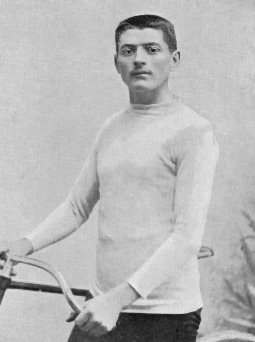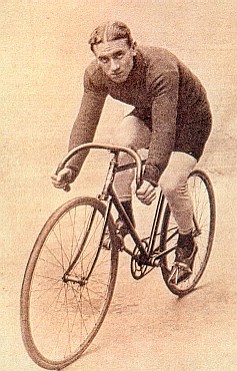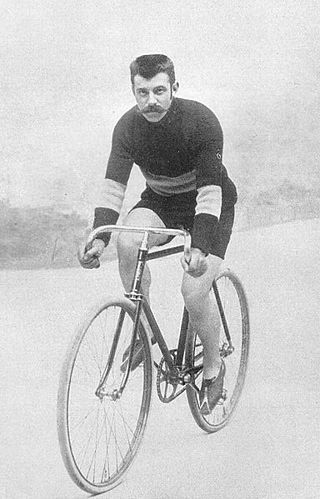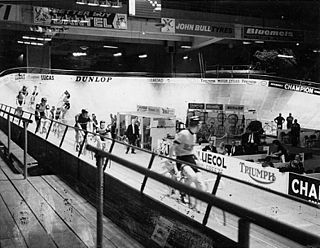
Keirin – literally "racing cycle" – is a form of motor-paced cycle racing in which track cyclists sprint for victory following a speed-controlled start behind a motorized or non-motorized pacer. It was developed in Japan around 1948 for gambling purposes and became an official event at the 2000 Olympics in Sydney, Australia.

The 1900 Summer Olympics were held as part of the 1900 World's Fair, during which many cycling events were contested. The IOC website currently affirms a total of 3 medal events, after accepting, as it appears, the recommendation of Olympic historian Bill Mallon regarding events that should be considered "Olympic". These additional events include the men's points race. Thus, three cycling events are considered Olympic events. These three competitions were held between 9 September and 16 September 1900. The cycling part of the World's Fair included 250 competitors, 160 of them French. In the sprint and 25 km events, 72 competitors, all men, from seven nations competed.

Constant Huret, nicknamed "le Boulanger" was a French long distance track racing cyclist. He was a professional from 1894 to 1902.

Maurice-François Garin was an Italian-French road bicycle racer best known for winning the inaugural Tour de France in 1903, and for being stripped of his title in the second Tour in 1904 along with eight others, for cheating. He was of Italian origin but adopted French nationality on 21 December 1901.
Cycle sport is competitive physical activity using bicycles. There are several categories of bicycle racing including road bicycle racing, cyclo-cross, mountain bike racing, track cycling, BMX, and cycle speedway. Non-racing cycling sports include artistic cycling, cycle polo, freestyle BMX, mountain bike trials, hardcourt bike polo and cycleball. The Union Cycliste Internationale (UCI) is the world governing body for cycling and international competitive cycling events. The International Human Powered Vehicle Association is the governing body for human-powered vehicles that imposes far fewer restrictions on their design than does the UCI. The UltraMarathon Cycling Association is the governing body for many ultra-distance cycling races.

Road bicycle racing is the cycle sport discipline of road cycling, held primarily on paved roads. Road racing is the most popular professional form of bicycle racing, in terms of numbers of competitors, events and spectators. The two most common competition formats are mass start events, where riders start simultaneously and race to a set finish point; and time trials, where individual riders or teams race a course alone against the clock. Stage races or "tours" take multiple days, and consist of several mass-start or time-trial stages ridden consecutively.
The Bordeaux–Paris professional cycle race was one of Europe's classic cycle races, and one of the longest in the professional calendar, covering approximately 560 km (350 mi) – more than twice most single-day races. It started in northern Bordeaux in southwest France at 2am and finished in the capital Paris 14 hours later. The professional event was held from 1891 until 1988. It was held as an amateur event in 2014.

Frederick Thomas Bidlake was an English racing cyclist of the late 19th century, who became one of the most notable administrators of British road bicycle racing during the early 20th century. The annual Bidlake Memorial Prize, was instituted in his memory. He was a timekeeper in cycling, motorcycling and for seaplane races in the 1930s.

Louis Trousselier was a French racing cyclist who won the 1905 Tour de France. His other major wins were Paris–Roubaix, also in 1905, and the 1908 Bordeaux–Paris. He came third in the 1906 Tour de France and won 13 stages of the Tour de France over his career. He also competed in the men's 25 kilometres event at the 1900 Summer Olympics and won a bronze medal in the Men's points race.

The Bol d’Or is a 24-hour endurance race for motorcycles, held annually in France. The race is part of the FIM Endurance World Championship. The riding of each bike is now shared by a team of three riders.

George Pilkington Mills was the dominant English racing cyclist of his generation, and winner of the inaugural Bordeaux–Paris cycle race. He frequently rode from Land's End to John o' Groats, holding the world record time on six occasions between 1886 and 1895. He was a member of the Anfield and North Road cycling clubs. He later won races and broke records as a car racer and motorcycle rider.

The Vélodrome Buffalo and Stade Buffalo were cycling tracks in Paris. The first existed from 1892 until World War I. The second from 1922 until 1957.

Leonard "Leon" Lewis Meredith was a British track and road racing cyclist who competed in the 1908 Summer Olympics, in the 1912 Summer Olympics, and in the 1920 Summer Olympics. He won seven world championships, set up one of Britain's largest cycle-parts companies, and ran a roller skating rink and ballroom.
Charles Frederick Davey was a British racing cyclist who rode in the Olympic Games, the world championship and the marathon Bol d'Or race.

The Critérium des As was a cycle race that was generally held at the end of the season, with entry by invitation only, for the leading riders of the season. Competitors rode behind pacers on tandems or motorcycles. It was held from 1921 until 1990, mostly in Paris, France but also in Switzerland and Holland. The last Critérium des As was held in 1990 and was replaced by the Roue d'Or des As the following year.

Motor-paced racing and motor-paced cycling refer to cycling behind a pacer in a car or more usually on a motorcycle. The cyclist follows as close as they can to benefit from the slipstream of their pacer. The first paced races were behind other cyclists, sometimes as many as five riders on the same tandem. Bordeaux-Paris and record attempts have been ridden behind cars. More usually races or training are behind motorcycles.

Mathieu Cordang was a Dutch professional cyclist. His specialties were track racing and endurance racing.
Arthur Adalbert Chase was a British professional cyclist born in Blackheath, Kent.

The Six Day London is a six-day track cycling race held annually in London, United Kingdom. The competition consists of six consecutive evening sessions of track cycling: Madison, Sprint, Elimination, Keirin, Derny and Team Time Trial disciplines. Six day invites the world's elite Men's and Women's riders, as well as sprinters and emerging talent from around the world. The overall winner is the team which takes the most laps.














